Dentures – Arvada, CA
An Affordable Way to Restore Your Smile
Tooth loss affects millions of Americans throughout the United States. When you’re missing a few, most of, or all of your teeth, everyday tasks, like eating and speaking, are made much more challenging. The good news is that there is an affordable way to restore your smile. At West Arvada Family Dental, Dr. Jeramiah Paylor offers high-quality dentures to give you your smile back. For more information on dentures in Arvada or to schedule your initial consultation, just give us a call!
Why Choose West Arvada Family Dental for Dentures?
- Customized for a Natural Appearance
- In-Network with Most PPO Insurance Plans
- In-House Membership Plan Available
Who’s a Good Candidate for Dentures?

Most adults are able to get dentures. Dentures are a great option for patients who are missing anywhere from a few to all of their teeth. Depending on the number of teeth that you are missing and where they are in the mouth, a custom plan can be created for you. Just remember that if you have any existing oral health issues, like tooth decay or gum disease, they will need to be treated before you’re able to move forward in the process of getting dentures in Arvada. Here are some things for you to keep in mind.
Effects of Missing Teeth

Tooth loss can have a variety of different causes. This can include anything from tooth decay to gum disease to injury. According to the American Academy of Periodontology, there are numerous negative consequences of missing teeth, like facial sagging, difficulty speaking, trouble eating, and lower self-esteem. By opting for dentures to restore incomplete smiles, patients are able to improve these areas of their lives and show off a smile that makes them feel confident!
What Qualifies You for Dentures?

Dentures are ideal for those to have experienced significant tooth loss but have sufficient gum tissue and jawbone. Those who receive dentures must be committed to their dental health routine and willing to properly care for their new dentures and oral health going forward.
The number of teeth missing and where they are located in the mouth will ultimately determine which type of denture is ideal for you. Another great thing about dentures is that they are more affordable than other tooth replacement options, like dental implants, making them a good option for patients who are unable to invest much money into their smile at this time.
Alternative Tooth-Replacement Options

If you don’t make a good candidate for dentures or you want to consider other tooth replacements, here are some you may want to consider:
- Dental Bridges: Dental bridges are ideal for patients who are only missing one or a few teeth. They work by “bridging” the gap with a replacement tooth. Dental bridges are supported by crowns that are placed on the adjacent teeth or dental implants.
- Dental Implants: Dental implants are titanium, screw-like implants that are surgically inserted into the jawbone to act as missing teeth roots. Replacement teeth are then attached to the implants. Since a titanium post is inserted into the jawbone, patients must have a solid bone structure. This option is more costly than traditional dentures, but it’s intended to be permanent.
Types of Dentures

During your consultation, we will determine which of the following dentures types is most ideal for your smile:
Partial Dentures
If a dental bridge isn’t quite enough to restore your smile, a partial denture may be a better option. They are customized to fit perfectly in the mouth between your remaining healthy teeth. Partial dentures can replace teeth in different locations and keep neighboring teeth from shifting around and causing misalignment issues.
Full Dentures
Full dentures are supported by the shape of your mouth and natural suction of the gums. They are used to replace an entire arch of missing teeth, either on the top or bottom. It is crafted with a lifelike base and enamel-colored set of replacement teeth. This way, your smile will have an appearance that’s perfectly natural-looking.
Implant Dentures
If you want a more stable, longer-lasting tooth replacement option, dental implant dentures could be what you’re looking for. First, we will place a series of dental implants throughout the jawbone before attaching the customized restoration. With implant dentures, you can expect 70% of your natural chewing function to be restored. This type of denture is designed to last for decades with proper maintenance, so you won’t need to worry about replacements as the years go by. To be a good candidate for implant dentures, you need to have a strong jawbone to support them. During your initial consultation, we can discuss whether or not this tooth replacement option is best for you.
How Dentures are Made
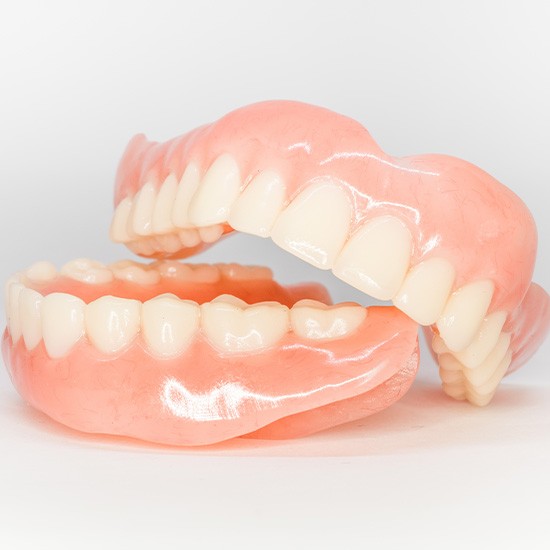
We want our patients to feel like they’re fully informed about the care they receive. As such, if you’re planning on getting dentures to replace your missing teeth, we encourage you to learn more about the process through which your new prosthesis will be created. That way, when you finally receive your new teeth, you’ll know just what went into personalizing them for your smile! Read on for more information about the denture creation process.
What are Dentures Made Of?
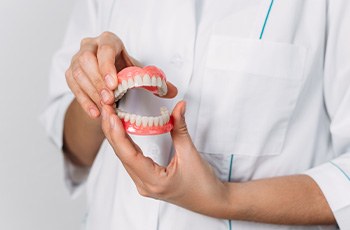
When it comes to making dentures, one of the first questions that comes to mind is, “What materials will be used?” The answer differs depending on which part of the denture you’re talking about:
- The base of the denture is often made from acrylic. Other materials are sometimes used, but acrylic tends to be favored since it can be designed to blend in with the gums. A partial denture can have an acrylic base that also includes metal clasps.
- The artificial teeth can be made from resin or porcelain, which are both materials known for their ability to mimic the appearance of your natural teeth. Porcelain is often chosen for its aesthetic advantages as well as its durability.
The Denture Creation Process
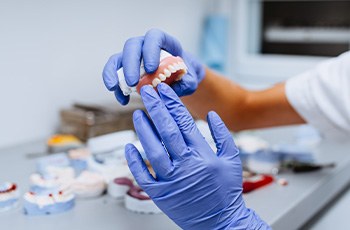
Once you’ve decided to get dentures, the process of having them made can move forward. Here’s what the individual steps look like:
- At our office, our dental team will capture impressions of your gums. We’ll then make a model of your mouth, which we can send to a dental laboratory.
- The technicians at the laboratory will create a wax replica of your gumline using the model we sent them as a reference.
- Using a device called an articulator, the technicians will insert artificial teeth into the wax. Some minor adjustments may be made afterward.
- The wax dentures will be sent to our lab. We’ll schedule a fitting appointment with you to make sure the dentures are the right shape and size. If everything looks okay, the dentures will be returned to the lab so that the next steps can be taken.
- The wax dentures will be placed into a flask. After plaster is added, the flask will be exposed to hot water. The wax portions will melt away, but the dentures will keep their shape thanks to the plaster.
- Acrylic will be injected into the flask to act as the new base for the dentures.
- The dentures will be taken out of the flask, and the plaster will be removed. Excess acrylic will be trimmed away, and the completed prosthesis will be polished.
- We’ll be able to give you the completed dentures once they have been returned to our office. Our team will double-check to make sure everything looks okay and make last-minute adjustments if need be.
Adjusting to Your New Dentures

Your dentures will eventually feel similar to your natural teeth, but you can normally expect your mouth to need a little time to adjust. Some discomfort may occur, but it should only be temporary. Our team can give you tips for making sure the adjustment period goes smoothly, such as only eating soft foods.
The Benefits of Dentures

Once you have received your dentures, you’re likely to notice a number of improvements in many aspects of your life. Missing teeth can lead to all sorts of issues, but the simple act of recompleting your grin with dentures can help you put these problems behind you. What makes dentures worth getting? Below, you can learn more about some of the most important benefits that we want all of our patients to be aware of.
Psychological Benefits

You’re likely to start feeling a lot better about yourself after getting dentures. Tooth loss commonly leads to feelings of depression, and it can leave you feeling anxious about your appearance whenever you’re in social situations. With dentures, you will once again have a complete set of teeth, which can help you feel significantly more confident when interacting with others.
Clearer Enunciation

Whether you need to communicate something important to your boss or simply want to have a relaxing chat with a friend, it’s important to be able to enunciate your words properly so that you don’t have any trouble being understood. Sadly, losing teeth can often interfere with the proper pronunciation of a variety of words. Luckily, dentures can restore your ability to enunciate; once you have had a chance to get used to them, it shouldn’t be long before you’re once again speaking clearly and with full confidence.
Improves Nutrition

Have you had to change your eating habits after tooth loss? Having multiple gaps in your smile can make chewing problematic, potentially leading to digestion problems. On top of that, you may be prevented from eating certain foods entirely, which might increase your risk of malnutrition. With dentures, you will be able to enjoy a much more varied diet, which is important for protecting your overall health.
Preserves Oral Health

If you want to maintain a healthy mouth, it will be much easier to do so if you get dentures to fill in the empty space. Gaps in your smile can cause your remaining teeth to start to drift out of place. Partial dentures can help make sure your teeth stay where they are, thus preventing alignment issues and lowering your risk for additional oral health problems. On top of that, dentures will help properly distribute the pressure associated with biting and chewing so that your remaining teeth don’t wear down too quickly.
Expands Opportunities

When you meet someone new, there’s a good chance that your smile will be one of the first things they notice about you. As such, having a beautiful grin can go a long way toward helping you find success in your professional and personal lives. And of course, one way to ensure that your smile leaves a truly positive impression is to replace any missing teeth with personalized, natural-looking dentures that draw attention for all the right reasons.
Understanding the Cost of Dentures

Wondering about the cost of dentures in Arvada? These classic restorations remain one of the most popular ways to replace missing teeth thanks to their affordability and dependability. The price of your specific denture will vary based on a few unique factors, such as what type of denture you’re interested in and what it’s made of. We’ll be able to give you a personalized estimate of how much you can expect to pay once we’ve had a chance to evaluate you and discuss your goals for your smile. Then, we’ll be happy to review your insurance coverage and other options for making dentures affordable. Read on as we go over some important information about the cost of dentures.
Factors that Affect the Cost of Dentures

Generally speaking, there are three main factors that will influence the final price of your dentures:
- Your current oral health: Issues like gum disease and tooth decay will need to be treated before we can fit you with dentures. This means you may need to factor in the price of a preliminary gum disease treatment or tooth extraction when calculating the cost of dentures.
- Materials used for your denture: While dentures can be crafted out of a wide variety of materials, we only use high-quality options to ensure you get the durable, lifelike replacement teeth you deserve.
- The type of denture you need: As you may have guessed, the larger the denture, the higher the price. Partial dentures will often cost less than full dentures, and getting a single denture will cost less than getting a set of dentures.
Are Implant Dentures More Expensive?

Thanks to modern dental technology, we can now pair dentures with dental implants for optimal results. Dental implants work as replacement tooth roots, giving the denture unmatched stability, comfort, and functionality. Implant dentures cost more time and money than their traditional removable counterparts. However, they can easily become the more cost-effective option over time since implant dentures don’t need to be replaced nearly as often as traditional dentures. Plus, implant dentures will help prevent further tooth loss, oral health issues, and jawbone deterioration, as well as the costs of addressing these issues. If you’d like to learn if investing in implant dentures is a smart choice for you, we invite you to visit us for a consultation.
Learn More About Implant Dentures
Does Dental Insurance Cover Dentures?

It’s important that you review the details of your dental insurance policy or contact your provider to fully understand what you can expect to pay for. Fortunately, dentures are typically considered to be a “major procedure” that earns around 50% coverage from dental insurance. Our knowledgeable staff has years of experience navigating dental insurance details and will always go above and beyond to ensure your benefits are being maximized.
Other Options for Making Dentures Affordable

Outside of dental insurance, we’re proud to offer several ways to help make dentures more affordable:
- Our in-office dental membership plan: Our membership plan works very similarly to dental insurance, but with a lower price and no confusing jargon. For a flat annual or monthly fee, you’ll get fully covered preventive care as well as deep discounts on our other services, including dentures.
- Flexible financing through CareCredit: We’ve also partnered with CareCredit to offer low- to no-interest payment plans for dentures. Qualifying patients can break down the cost of their dentures into smaller chunks that fit into their monthly budget.
Dentures Aftercare

With your dentures in place, you can enjoy the many benefits of a fully transformed smile. That said, it’s important to continue to visit your dentist regularly. This allows them to monitor not only your oral health but also the condition of your restoration. That way, if a problem arises, they can address it quickly before it progresses.
There are also proactive steps you can take to ensure that your mouth and prosthetics stay in good shape. Continue reading to learn more about how to maintain your dentures, and feel free to contact us with any additional questions you may have.
Remove After Eating

One of the greatest advantages of dentures is that they allow you to chew more easily, allowing you to enjoy a wholesome diet. However, it’s important to keep them clear of food particles after meals. Any leftover bits of food will attract harmful bacteria that can contribute to gum disease.
To ensure that you can continue to make the most of your restoration, it’s a good idea to rinse it after meals. To do so, remove your dentures and run them under gently running water. Remember to use cool or room-temperature water because higher temperatures can warp the acrylic, causing them to no longer fit correctly.
Clean Your Restoration
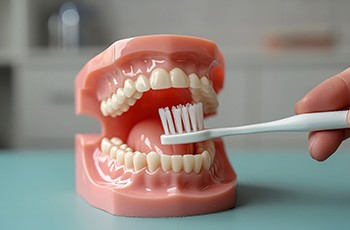
In addition to a quick bath after eating, it’s important to take your dentures out both morning and night for a thorough cleaning. Use a soft-bristled brush and mild dish soap rather than toothpaste to avoid abrading the material. Then, carefully scrub all the surfaces, including any clasps or grooves, to eradicate as many germs as possible.
Keep Your Dentures Safe
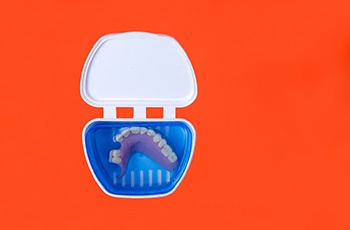
Although your dentures can last for years with the right care, it’s possible to accidentally damage them. For example, it’s not uncommon for them to slip out of your fingers when you’re brushing them because they’re slippery. The drop from your bathroom sink to the floor could fracture them.
You can place a towel underneath you during cleaning to prevent them from breaking if they fall. Also, try to keep them out of the reach of small children or pets who might handle them harshly.
Remove Dentures When You Sleep
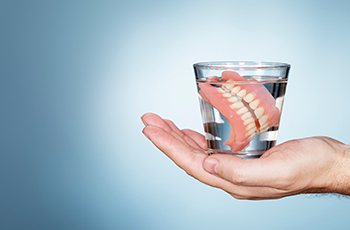
Once you’ve adjusted to wearing your dentures, you may feel so comfortable that you’re tempted to fall asleep with them in your mouth rather than take them out to brush them. Unfortunately, if you do, you could damage your oral health. Your gums need a break from the constant pressure of supporting your restoration all day, or they could become swollen and irritated. Plus, your mouth tends to dry out at night, which allows bacteria to thrive. This can put you at an increased risk of gum disease.
It's best to let them soak in a container with water or a special cleaning solution. This can kill up to 99% of germs as well as help your prosthetics retain their shape.
Notice Changes
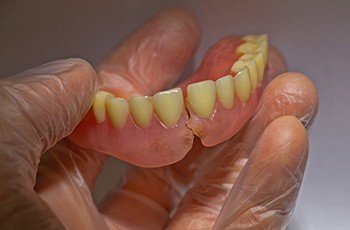
It’s important that you pay attention to what’s happening in your mouth so that you notice if there’s a change. For example, if your gums start to look red or inflamed, you might have gum disease and need to visit the dentist before it gets worse.
Also, be aware of any slight alterations in your dentures. It’s important to get professional help if any issues arise. If they’re clicking, wiggling, or feeling loose, they may need to be repaired or replaced. Don’t try to fix them at home because your attempts could end up damaging them and/or your mouth.
Dentures FAQs

Dentures in Arvada are an affordable way to restore your smile! However, it’s only natural to have some questions that need to be answered before you can tell if they’re the right choice for you. When you visit us for your consultation, we’ll be more than happy to walk you through the entire treatment and answer all your questions personally. In the meantime, we’ve gathered some of the most common inquiries we get about dentures below so you can learn more about them. If you have more questions or would like to schedule your appointment, don’t hesitate to give us a call!
Should I Have All My Teeth Pulled to Get Dentures?
Our aim is always to preserve and repair your natural teeth whenever possible. Extracting a tooth is only recommended when it’s absolutely necessary, such as if the tooth is infected, damaged beyond repair, or poses a threat to the rest of your smile. If possible, we’ll try to save your natural teeth with crowns or root canal therapy. Should you need to have some teeth removed, a partial denture can let you keep your remaining healthy teeth and replace the ones that have been extracted. While there are some exceptions, it is generally not advisable to have all your teeth removed to get dentures unless absolutely necessary.
Can I Sleep with My Dentures?
No one wants to be caught without their smile! When you first begin wearing your dentures, we’ll likely instruct you to wear them all day every day for a week. This will help your mouth adjust to them and give you a better feel for how to handle your dentures. However, after this first week, you’ll need to start taking your dentures out every evening and soaking them while you sleep. Overnight soaking is the best way to thoroughly clean out all the little nooks and crannies that can potentially harbor oral bacteria. Plus, taking your dentures out before bed will give your gums a chance to rest.
What Is the Average Age for Dentures?
Tooth loss can happen at any age, especially if you are at a higher risk of it due to genetics, health conditions, or lifestyle choices. According to the National Center for Health Statistics, about 66% of adults between the ages of 40 and 64 are missing at least one tooth, whereas only 33% of adults between the ages of 20 and 39 experience tooth loss. In a different survey from the American Dental Association, nearly 57% of people between the ages of 65 and 74 wear some type of denture. So while adults of any age can potentially find themselves in need of a denture, it’s more likely after the age of 40.
Does It Hurt to Get Dentures?
The process of being fitted for dentures itself shouldn’t cause you any discomfort, except for perhaps a little soreness in your jaws due to keeping your mouth open during your appointment. It’s normal to experience minor irritation in your mouth for a short period of time as you adjust to your new dentures. This length of time will vary from patient to patient, but it typically takes about a month for most patients to get used to their new dentures. If your discomfort doesn’t seem to be going away or if it starts to get worse, give us a call right away so we can investigate the cause.
Do Dentures Break Easily?
While dentures are incredibly durable, they do not last forever and can break if exposed to too much pressure. With excellent care, most dentures can last between five and seven years, but accidents happen. Many appliances have been broken due to being dropped while being removed, cleaned, or inserted, and prosthetic devices can also break due to tiny defects in their structure such as scratches and notches. Even if you take excellent care of your dentures, they can still erode and break down over time due to the stress of frequent use. Contact the team at West Arvada Family Dental if your denture isn’t working properly so we can adjust it, repair it, or replace it as necessary.
What Should You Do if Your Dentures Break?
The nature and severity of the damage will determine whether the denture can be repaired, so contact our office as soon as you notice your appliance is broken or not fitting or working properly. We can often repair chipped or cracked teeth with composite resin and adjust dentures that fit poorly so patients can wear them comfortably again. However, it will eventually be necessary to replace your appliance altogether. The most severe type of damage a denture can sustain is “prosthesis fracture,” meaning the appliance has broken in half. This is more likely to happen to top dentures, but it can happen to bottom ones as well.
Can Dentures Lose Their Fit Over Time?
Each set of dentures is completely customized to fit the patient’s mouth, so your appliance should be incredibly comfortable after you get used to wearing it. However, dentures do not address the problem of jawbone atrophy caused by tooth loss, so the mouth will continue to change shape over time after the patient receives their applaince. This can alter the way a prosthetic device fits, which can increase the patient’s risk of enamel damage, gum injuries, and oral infections. Dentures can also warp due to frequent stress or being exposed to excessively hot or cold water. If your appliance is not fitting as well as it used to, contact our office to schedule an appointment so we can evaluate the problem and determine an appropriate solution. While we can reline or adjust an appliance in many cases, it will eventually be necessary to replace your denture completely. Sometimes, patients can use denture adhesives to help their appliances fit comfortably between adjustments, so you may wish to experiment with products from your local grocery store or pharmacy.

